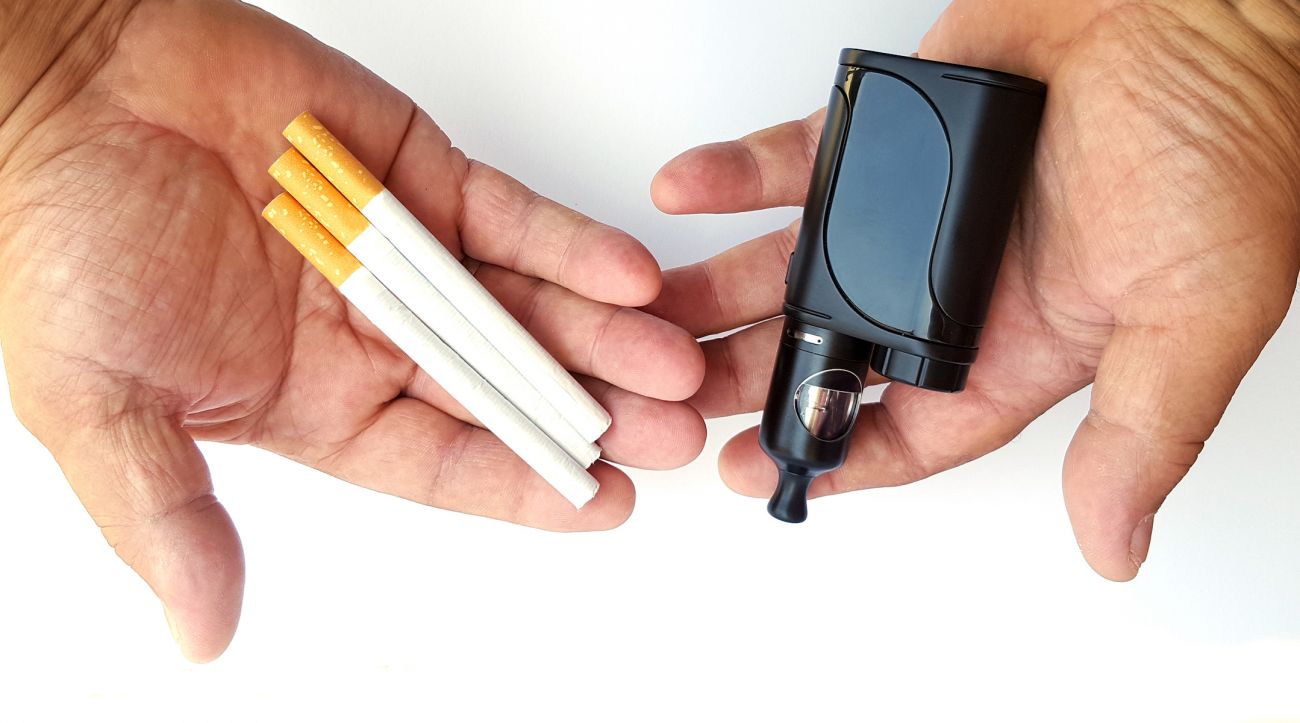While e-cigarettes have become popular, they are not an FDA-approved medication to quit smoking.
Their effectiveness as a tobacco-cessation treatment and their long-term safety are still unknown. The nicotine patch, gum, and lozenge are just some of seven FDA-approved medications for quitting smoking and using these medications can double your chances of quitting successfully.
Still, many tobacco smokers try using e-cigarettes as a way to cut back their cigarette smoking. Evidence has shown that e-cigarettes can be less harmful to a person’s health in the short-term when someone who regularly smokes completely switches to them, but they still deliver aerosols and other harmful chemicals. “E-cigarettes are a close substitute to tobacco cigarettes,” says Roswell Park’s Maciej Goniewicz, PhD, PharmD, a researcher in the Department of Health Behavior. “If a smoker uses e-cigarettes, it needs to be complete substitution. The most important thing is to get away from combustible cigarettes.” E-cigarettes are not a smoking cessation device; however, they can help to alleviate withdrawal symptoms because of their ability to quickly deliver nicotine.
Studying the E-Cigarette Transition
A recent study conducted by Roswell Park in collaboration with University at Buffalo and University of California San Francisco revealed important information for smokers considering the switch to e-cigarettes. Given the variety of vaporized nicotine products (VNPs) on the market, researchers wanted to find out which products smokers preferred to use instead of traditional cigarettes.
Over the course of the seven-week study, 18 daily cigarette users tested six different VNPs: disposable, rechargeable, eGo, mod, e-Cigar, and e-Pipe. Each week, a participant was given a different VNP to use daily instead of normal cigarettes. They assessed each VNP based on characteristics of satisfaction, enjoyment, perceived harm, speed of urge relief, amount of urge relief, harshness, taste, pleasantness, and embarrassment from use. Additionally, once per week participants used each device in a Roswell Park laboratory and blood samples were collected to quantitatively assess nicotine delivery levels in the bloodstream. The blood samples confirmed that the devices users found most effective in alleviating unpleasant nicotine withdrawal symptoms were the ones with higher nicotine delivery.
The smokers in this study preferred smaller devices with high nicotine delivery, such as the eGo and mod devices, which they perceived as less harmful, and claimed they were easy to use and had an enjoyable taste. Smaller devices with higher nicotine levels allowed for participants to control their smoking craving more effectively. “E-cigarettes are better to alleviate symptoms because they can do it faster. Smokers can adjust their nicotine intake as he or she needs,” says Dr. Goniewicz.
Never miss another Cancer Talk blog!
Sign up to receive our monthly Cancer Talk e-newsletter.
Sign up!What About JUUL?
JUUL, introduced to the market in 2015, quickly rose to the top of the e-cigarette market and generated $245 million from sales in 2017. JUUL is a small, rectangular device in which JUULpods of varying liquid nicotine levels and flavors can be inserted. Although it was not used in this study, JUUL has the characteristics that regular adult smokers appear to prefer — small, easy to use and an effective nicotine delivery system.
Unfortunately, these devices, which can be beneficial for adult smokers, are also surging in popularity among youth. JUUL products have intensified the youth vaping epidemic by creating exotic flavors such as mango and cucumber and using advertisement tactics which directly appeal to young people. A study conducted by the Food and Drug Administration (FDA) and Centers for Disease Control and Prevention found that e-cigarette use in middle and high school students rose from 1.5 million in 2017 to 3.6 million in 2018, more than a 75% increase.
According to the Surgeon General, the upsurge in e-cigarettes has greatly increased youth nicotine exposure — which during adolescence can damage developing brains and increase the risk for future addiction to cigarettes and other drugs. In response, the FDA is taking steps to restrict the sale of exotic vaping flavors and raising the purchasing age to 21. Here in New York State, starting in November the purchase of all tobacco products, including e-cigarettes, will be illegal for those under the age of 21.
Support to Quit
For smokers trying to quit, Dr. Goniewicz recommends to first try cessation medications, or get support from Roswell Park, your healthcare provider or the New York State Smokers’ Quitline.
The Tobacco Treatment Service is available to all Roswell Park patients and includes group and phone sessions. The service reaches out to all patients who use tobacco, but you can always contact 716-845-1300 ext. 7851 or treattobacco@roswellpark.org.
Not a Roswell Park patient? Access the Quitline by visiting nysmokefree.com or calling 1-866-NY-QUITS (1-866-697-8487).



